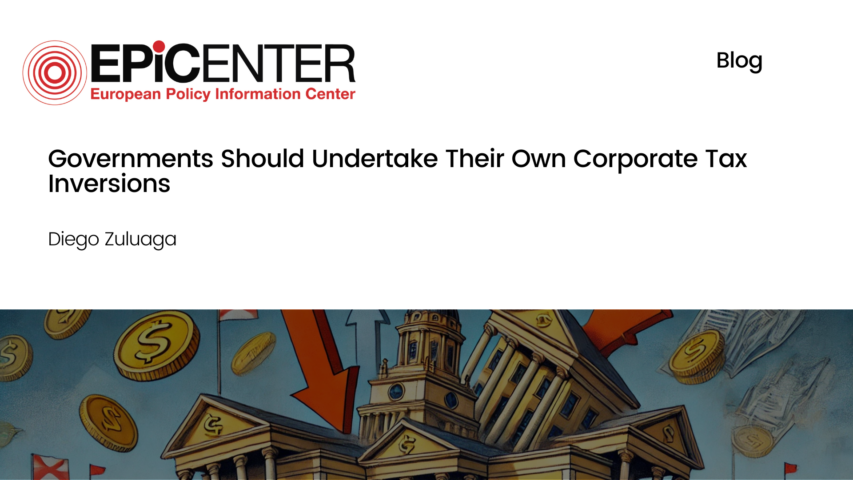Governments Should Undertake Their Own Corporate Tax Inversions

Governments Should Undertake Their Own Corporate Tax Inversions
Diego Zuluaga // 20.11.2015
The U.S. Treasury has announced measures to prevent American companies from merging with foreign firms and shifting their tax domicile in the process, a practice known as a tax inversion (where the primary aim of the shift is to lower the merged firms’ tax liability). This comes as pharma giant Pfizer prepares to acquire Ireland-based Allergan and move its corporate headquarters to Dublin.
If it is true that Pfizer’s move is mainly guided by tax motivations, it can only be seen as a strong indictment of U.S. corporate tax policy. After all, it takes terrible policy to prompt a firm to spend $150 billion on a foreign purchase in order to be able to move to a more welcoming tax environment.
And indeed, the U.S. corporate tax system combines a number of awful features that make it inefficient and uncompetitive. First of all, its statutory rate can be as high as 39 per cent, making it by far the highest in the developed world. Secondly, the tax code is riddled with loopholes, which make compliance difficult, narrow the tax base (which makes the system less efficient), and favours certain sectors and firms, particularly big ones with the resources to hire accountants to navigate the code. Finally, the U.S. operates a worldwide tax system, meaning profits earned abroad are taxed according to the American rate, at least partly. This has encouraged firms to stash as much as $2.1 trillion in cash abroad – money which could be more productively invested in America but isn’t because of the U.S.’s punitive tax rate.
There can thus be little doubt that the appetite for tax inversions is a consequence of America’s underperforming tax code, combined with better tax policy in other jurisdictions (some of them in Europe). But even then, it is absurd to condemn firms for taking potential tax liabilities into account when making business decisions. Just imagine a similar scenario on a smaller scale: if I want to set up an e-commerce business and I can choose from a number of EU Member States, low-tax jurisdictions (other things being equal) will be more likely to earn my favour. As things currently stand on the tax front, I’d rather set up shop in Ireland or the UK than in Spain (much as I prefer warmer climates).
The more worrying issue is that we’re quickly moving into a situation where it seems that all business is good for is to bankroll our public spending. That is no way to promote entrepreneurship or bring about prosperity. It is, on the other hand, a blueprint for driving productive activity away from one’s shores. The U.S., because of its economic preponderance and its otherwise entrepreneurial culture, has been able to retain investment despite its dysfunctional tax code. But the U.S. Treasury cannot expect this to go on forever.
The U.S. government, and its high-tax European counterparts in Europe, should consider their own tax inversions: from a high-rate, high-loophole, high-burden environment to something more conducive to investment and risk-taking.
EPICENTER publications and contributions from our member think tanks are designed to promote the discussion of economic issues and the role of markets in solving economic and social problems. As with all EPICENTER publications, the views expressed here are those of the author and not EPICENTER or its member think tanks (which have no corporate view).



